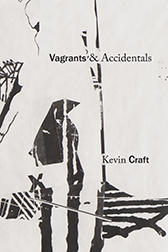Literary Event of the Week: Kevin Craft at Open Books
Kevin Craft is one of the hardest-working people in Seattle literature. As a teacher, he works on literary programs at Everett Community College and University of Washington. As an editor, he ran Poetry Northwest magazine for seven years and has compiled five anthologies. As a publisher he just built a new press, Poetry Northwest Editions, that will launch with a new collection from Sierra Nelson this year. And as a writer, he’s..well, he’s published and performed a lot of poems in a lot of places, but he actually only produced one collection to his name, and that was published over a decade ago. Craft has been so tirelessly promoting the works of others for so long that his own work has received short shrift.

Until now. The University of Washington Press’s Pacific Northwest Poetry Series has shepherded a gorgeous new collection of Craft’s poetry into being. It’s titled Vagrants & Accidentals, and it feels like a book that’s been bottled up for a decade, just waiting to be introduced to an unsuspecting world.
The poetry in Vagrants is eager and obsessed with big ideas like evolution and the act of becoming. “Old Paradox” reminds the reader to “Consider that it’s difficult/if not impossible to discover the exact/moment a tadpole becomes a frog.” Life is change. If you’re not metamorphosing, you’re probably dead.
“The Descent” is its own sort of creation myth, a blend of equal parts Bible and Darwin:
There was daylight before we grew eyes.
There were grasses therefore we grew lungs.
There were speeches therefore we grew an earful.
There were speeches we grew wary of.
That first stanza is an evolutionary take on “let there be light,” one which suggests we sprang from the void to observe and partake in the world because there was a world just waiting to be observed. The second stanza gets into the idea of writing and reading — the concept that listening developed as a response to talking, and not the other way around. And then after the creation of the word came the fear of the word, the understanding that words have power and that this power can be used for good and for evil.
And that’s where the poet comes in.
The relationship between the poet and the world may not be a chicken-and-egg situation — we know the world was here before the first poet — but Craft argues that without the eyes to see and the lips to speak and the fingers to write, the world may as well not have existed at all. On that same wavelength, a Seattle without Craft’s poetry in it would be a forgettable dot on a map. He breathes life into our world, as an editor and publisher and, most definitely, as a poet.